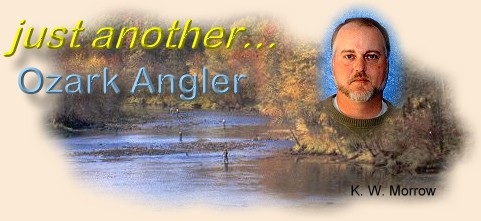|
I guess it's this unseasonably cool weather, but
I caught my thoughts turning toward bird hunting
this morning. With dove seasons opening nationwide
within the next few weeks and teal and grouse
seasons opening shortly thereafter, I found myself
making a list of things to do to prepare for the
wingshooting openers. One of the items on my list
is to take an inventory of my feathers for fly tying.
Dove feathers make an excellent substitute for many
soft hackle patterns. Teal feathers can be used in
a number of dry flies and emergers. Early goose
season provides opportunities to harvest good biot.
And when the later seasons open on quail, pheasants,
and regular ducks; there are a host of other feathers
to stock up on after successful hunts.
Most states' dove seasons open September 1st. Teal
season generally falls in mid-September as these small
ducks migrate to the Gulf of Mexico. Early goose
seasons generally fall in September and October.
Wise fly tiers across the country are sending cards,
making phone calls, or stopping by with a jar of the
wife's homemade blackberry jam - reuniting with their
bird hunting relatives, friends, and neighbors - and
subtly reminding them not to forget about those feathers.
Many anglers and fly tiers are not aware of federal
regulations regarding the feathers and skins of
migratory birds and how they must be shipped and
handled. So I thought I'd take a minute this week
to point some things out on that subject.
Federal regulations strictly prohibit the commercial
trade in migratory bird parts including feathers.
So don't offer to pay for them. But hunters
are free to give them away, so long as they
play by the rules. Basically, what that means is
that if Uncle Brent is going to mail you some CDC
and Mallard flank feathers, here's what he needs
to do:
1. If he's shipping a whole frozen bird, he must
tag the carcass with a tag bearing his name, address,
date harvested, species, and sex. This tag must
remain with the bird parts until they are finally
used in their entirety. It is legal to ship them
in this manner via USPS.
2. If he sends feathers, wings, etc. then the
container should be clearly marked or labeled with
the same information as above. It is incumbent upon
the receiver to keep the tag with the bird parts
until they are used.
Now, that's a summary of the law, but my personal
experience has demonstrated that it's pretty much
fine if you just keep the tags with your fly tying
materials. The chances of a game warden entering
your home are probably pretty slim if you're reading
this. But, if you travel with fly tying supplies,
you need to make sure you're legal. A warden checking
you out on the stream or boat launch is well-versed
in these regulations, and fines can be quite hefty.
Bird hunters can be an excellent source of fly
tying materials. So, you better buddy up to one
near you before some other fly tier does. Whether
you need Pheasant tail feathers, Wood Duck flank
feathers, or Grouse necks, it's well worth a bottle
of your wingshooting buddy's favorite poison to make
sure he's thinking of you during the Fall.
The aforementioned regulations for tagging and
transporting migratory game bird parts apply to
all doves, ducks, geese, rails, snipes, gallinule
and woodcock. But they do not apply to other game
bird species like quail, grouse, pheasant, or
turkeys. Those feathers can be shipped and stored
without tagging.
Now, back to my pre-Fall check lists... ~ Ken
About Ken:
Ken graduated from Southern Methodist University
in 1988, and spent the next several years serving
in the United States Navy as an intelligence analyst
and Russian Language translator. He is a veteran
of Desert Shield and Desert Storm. Leaving the
nation's service in 1993.
Ken is also a published outdoor writer and historian,
having penned articles and stories that have appeared
in several national hunting publications like North
American Hunter magazine, on GunMuse.com, in regional
and local newspapers, and historical and literary
journals. He also provides hunting and dog training
seminars for Bass Pro Shops and other sporting goods
retailers nationwide and works with other outdoors
businesses and conservation organizations in the
fields of public relations, promotional marketing,
fund-raising, and advertising. He also is a partner
in Silver Mallard Properties, LLC. He currently
resides with his wife, Wilma, their Weimaraner,
Smoky Joe, and their Labrador Retriever, Jake, in
Branson, Missouri, where he founded the
Branson/Tri-Lakes Chapter of Ducks Unlimited in 1998.
|

